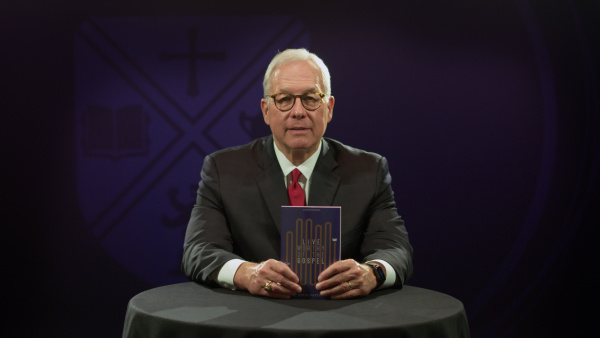PHILIPPIANS 2:3–4
Let nothing be done through strife or vainglory; but in lowliness of mind let each esteem other better than themselves. Look not every man on his own things, but every man also on the things of others.
Jesus and His disciples were making their way to Jerusalem. In anticipation of Christ’s coronation, James and John decided it was time to angle for the most prestigious positions they could imagine — sitting on either side of Jesus in the kingdom (Mark 10:37). Matthew records that their mother even knelt down to petition Christ for these honors (Matt. 20:20–21). She wanted her sons to have the best spots too. Jesus told them they didn’t realize what they were asking (Mark 10:38). He could promise them a baptism, by which He meant death for proclaiming the Truth, but their rank in glory was not His to give.
The situation angered the other disciples (Mark 10:41). The aspiration and audacity of the so-called Sons of Thunder ran roughshod over the other disciples’ own self-focused agendas. They had all laid aside other pursuits to follow Christ and wanted recognition for doing so.
Then Jesus called them together to readjust their thinking. In earthly kingdoms the “great ones exercise authority” (Mark 10:42). Importance is measured in terms of power. But it’s different in God’s kingdom. Success means ministry. It means subordinating yourself, not just to the Master but also to your fellow servants. Jesus said, “Whosoever of you will be the chiefest, shall be servant of all” (Mark 10:44).
What was true for Jesus’ original disciples is no less true for the rest of the church Christ bought with His blood. In Philippians 2 Paul presses forward with his appeal for living worthy of the Gospel by exhorting his readers to interact humbly with one another. A unified mindset requires humility, because humility is the essence of a Christlike disposition. The like-mindedness Paul commands all believers to have is a low-mindedness. Paul describes this gospel-focused humility in Philippians 2:3–4 and illustrates it in verse 5–11 with the example of Jesus Christ.
What Humility Is Not
PHILIPPIANS 2:3
Let nothing be done through strife or vainglory.
WORD STUDY
Strife — selfish ambition; selfish rivalry; aspiration without consideration or care for others
Vainglory — vanity; self-conceit; excessive ambition
In order to understand what humility is, we must be clear on what it is not. First of all, humility is not a self-deprecating attitude that means we have a low view of ourselves. In fact, thinking about ourselves isn’t part of a humble attitude at all. Secondly, Paul declares that a lowly mind is never motivated by “strife or vainglory.” A good illustration of strife is a politician who runs for office, ambitiously courts popular opinion, and competitively positions himself to win the race against any rival. He cares only about himself and is driven by selfish ambition. In fact, he resents the success of others and works to demonstrate his superiority.
Paul had experienced this kind of opposition personally. While he was in prison some fellow believers attempted to antagonize him by proclaiming Christ (Phil. 1:16–17). They evidently were jealous of Paul and territorial about their sphere of ministry. Perhaps they judged him inferior because he had landed in prison, and they wanted to highlight this supposed weakness. Even though Paul designated this attitude as a work of the flesh (Gal. 5:20), he rejoiced that the Gospel was being proclaimed, regardless of their motivation (Phil. 1:18). Yet, even though he was commendably gracious in his response to these rivals in Rome, Paul insisted that the Philippians recognize how damaging such a mentality is to Christian unity. Unity cannot coexist with this kind of ambition.
Similarly, a vainglorious person is motivated by selfish conceit. He has an inflated opinion of himself and lives only for the empty opinions and praise of others. After the Pharisees gave their money to God, a trumpet was blown in the temple in order to announce their contribution. Jesus declared, “They have their reward” (Matt. 6:2). Again, this kind of pride is the manifestation of our flesh (Gal. 5:26). If we do not want to be proud, we must “walk in the spirit” (Gal. 5:25). Humble people are never motivated by self-interest because their minds are set on the advancement of the Gospel, not on the advancement of their personal agendas. Paul forbids these forms of pride in the strongest of terms by using an emphatic double negative in Greek. We could translate the phrase as if a father were communicating a sober warning to his child: “Never ever act this way.”
What Humility Is
PHILIPPIANS 2:3–4
… but in lowliness of mind let each esteem other better than themselves. Look not every man on his own things, but every man also on the things of others.
WORD STUDY
Lowliness of mind — humility; modesty
Esteem — to think; to consider
Better — to have power over; to surpass; to excel
Look — to look out for; to keep one’s eyes on; to consider
We can often detect pride, especially in other people. A basketball player brags about how many points he scored. A musician smugly assumes her position as first chair. A politician runs a smear campaign against his opponent. A student laughs about how easy a certain class is. But what is humility? Is it simply avoiding “strife and vainglory”? As Paul continues his exhortation, he alludes to three positive elements of humility.
First, Paul describes humility in terms of what we value. The antidote to selfishness and pride is placing the importance of others ahead of our own. Paul is not suggesting that we grow careless about our own physical or spiritual well-being. It is virtually impossible, not to mention hazardous, not to have any concern for yourself. But we need to prioritize our values by ranking others ahead of ourselves. In other words, when humility is our attitude, we will regard our fellow brothers and sisters in Christ as the standouts, not ourselves. We will sincerely celebrate the success of others instead of maneuvering so that they notice our own. We will praise God for what He is doing through others and not take credit for what He may be doing through us. We will honor the legitimate preferences of others instead of insisting that everyone is aware of our own. This is what Paul means by his phrase in Romans 12:10, “in honour preferring one another.”
Next Paul describes humility in terms of what concerns us. He states, “Look not every man on his own things, but every man also on the things of others” (Phil. 2:4). As stated above, humility does not mean talking about yourself in a derogatory way. Humility means not focusing on yourself to begin with. To “look … on the things of others” is to give careful attention to their needs. For example, when a man notices that a woman is walking behind him entering a building, he anticipates an opportunity to show consideration and holds open the door. He puts his own desires not to waste time and not to put in more effort than the next guy in their proper place, because he is looking out for the interests of others, not just his own.
Paul recognizes that each of us has to give some attention to his own needs. (Note the word also in verse 4.) And he acknowledges that very few believers consistently display this mindset, as he mentions when commending Timothy (Phil. 2:21). But neither of these realities impedes Paul from directing us to get our eyes off ourselves so that we can “bear … one another’s burdens, and so fulfil the law of Christ” (Gal. 6:2). This kind of one-another ministry is essential to unity.
Ultimately, Paul describes humility in terms of how we view ourselves. Humility is “lowliness of mind.” It is when we lay ourselves low, like a doormat, that we are in the best position to receive God’s grace (James 4:6). It is also when we bear a striking resemblance to Jesus Christ, who is “meek and lowly in heart” (Matt. 11:29).
We find humility best illustrated in the attitude of a servant who is others oriented. The word lowliness describes a slave in biblical times. A slave stood on the lowest rung of the social ladder. Everyone else was above a slave. A slave had nothing to do in life but to serve those who were above him. Paul commands Christians to go low and to adopt a slave mentality. He and other New Testament writers showed the way by describing themselves as “a servant (i.e., bondslave) of Jesus Christ” (Rom. 1:1; James 1:1; Jude 1:1).
Those who are truly loving keep the value and importance of other people in the forefront of their minds. Our neighbors are worthy of our sacrificial service to them. We naturally look after our own interests; but when we are humble, we view the needs of others as if they were our own. The primary quality of humility is the way we think about others. Low-mindedness is the attitude that enables gospel-centered unity. As Jesus taught James and John and their colleagues, humble service is the counterintuitive path to success for citizens of His heavenly kingdom.
This post is from Live Worthy of the Gospel: A Study in Philippians by Steve Pettit. Copyright 2016 by BJU Press. Printed by permission of BJU Press.
This post is part of the study designed to correspond with the 2020 Fall Chapel Series. Watch the chapel message below:
Join us for chapel via live webcast at 11 a.m. every Monday and Wednesday.








